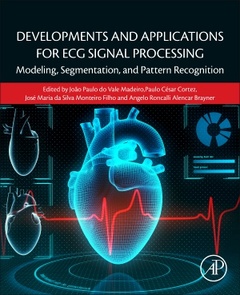Description
Developments and Applications for ECG Signal Processing
Modeling, Segmentation, and Pattern Recognition
Coordinators: do Vale Madeiro Joao Paulo, Cortez Paulo Cesar, Da Silva Monteiro Filho José Maria, Brayner Angelo Roncalli Alencar
Language: English
Subjects for Developments and Applications for ECG Signal Processing:
Keywords
Acquisition; Amplification; Analog filtering; Arrhythmia classification; Assistive technologies; Baseline wandering; Cardiac impulse; Classes of ECG beats; Common mode rejection; Conduction disorders; Critical points; Distortion; ECG databases; ECG electrodes; ECG filtering; ECG instrumentation; Electrocardiogram signal; Electrophysiology; Feature extraction; Feature selection; Frequency domain; Gaussian function; Heart electrical system; Heart rhythms; Human computer interactions; Human machine interface; Lead system; Learning algorithms; Machine learning; Mathematical modeling; Maximum slope; Monitoring; Muscle noise filtering; Protection; P-wave delineation; P-wave detection; Right leg circuit; Search window; Signal spectral content; Smart sensor; Time domain; Time-frequency domain; T-wave delineation; T-wave detection; User centred design; User involvement; User profile; Wavelet transform
210 p. · 19x23.3 cm · Paperback
Description
/li>Contents
/li>Readership
/li>Biography
/li>Comment
/li>
Developments and Applications for ECG Signal Processing: Modeling, Segmentation, and Pattern Recognition covers reliable techniques for ECG signal processing and their potential to significantly increase the applicability of ECG use in diagnosis. This book details a wide range of challenges in the processes of acquisition, preprocessing, segmentation, mathematical modelling and pattern recognition in ECG signals, presenting practical and robust solutions based on digital signal processing techniques. Users will find this to be a comprehensive resource that contributes to research on the automatic analysis of ECG signals and extends resources relating to rapid and accurate diagnoses, particularly for long-term signals.
Chapters cover classical and modern features surrounding f ECG signals, ECG signal acquisition systems, techniques for noise suppression for ECG signal processing, a delineation of the QRS complex, mathematical modelling of T- and P-waves, and the automatic classification of heartbeats.
2. ECG signal acquisition systems
3. Techniques for noise suppression for ECG signal processing
4. The issue of QRS detection
5. Delineation of QRS complex: challenges for the development of widely applicable algorithms
6. Mathematical modelling of T-wave and P-wave: a robust alternative for detecting and delineating those waveforms.
7. The issue of automatic classification of heartbeats
Researchers and postgraduate resarchers in electrical engineering and computing; researchers workong on digital processing and biological signals, artificial intelligence and pattern recognition; industry-based researchers developing microprocessable medical equipment (including electrical engineers, developers working on operating systems and diagnostic-aid software); cardiologists interested in pre-processing techniques for ECG signal feature extraction.
Paulo César Cortez is Full Professor at the Department of Teleinformatics Engineering at the Federal University of Ceará (UFC). His research focuses on artificial vision, primarily on 2D and 3D contours of polygonal modeling, pattern recognition, digital image segmentation, digital signal processing, biomedical imaging, computer-aided intelligent systems for biomedical signal analysis, telemedicine applications, and embedded systems. He has published widely in leading international journals, and presented at national and international conferences.
Dr. José Maria da Silva Monteiro Filho holds a Bachelor's Degree in Computer Science from the Federal University of Ceará (1998), a Master's Degree in Computer Science from the Federal University of Ceará (2001) and a PhD in Computer Science from the Pontifical Catholic University of Rio de Janeiro (PUC-Rio). He has experience in Computer Science, with emphasis on Database and Software Engineering, working mainly on the following topics: automatic tuning of databases, cloud databases, linked data on the Web and software quality.
Angelo Brayner graduated in Computer Science in 1988 from the Federal University of Ceará (UFC). In 1994, he obtained a Master's Degree in Computer Science from the State University of Campinas (UNICAMP), under the guidance of Profa. Dr. Cláudia Bauzer Medeiros. In 1999, he completed his doctorate in Computer Science by the Universität Kaiserslautern, Germany, under the gui
- Gives comprehensive coverage of ECG signal processing
- Presents development and parametrization techniques for ECG signal acquisition systems
- Analyzes and compares distortions caused by different digital filtering techniques for noise suppression applied over the ECG signal
- Describes how to identify if a digitized ECG signal presents irreversible distortion through analysis of its frequency components prior to, and after, filtering
- Considers how to enhance QRS complexes and differentiate these from artefacts, noise, and other characteristic waves under different scenarios

